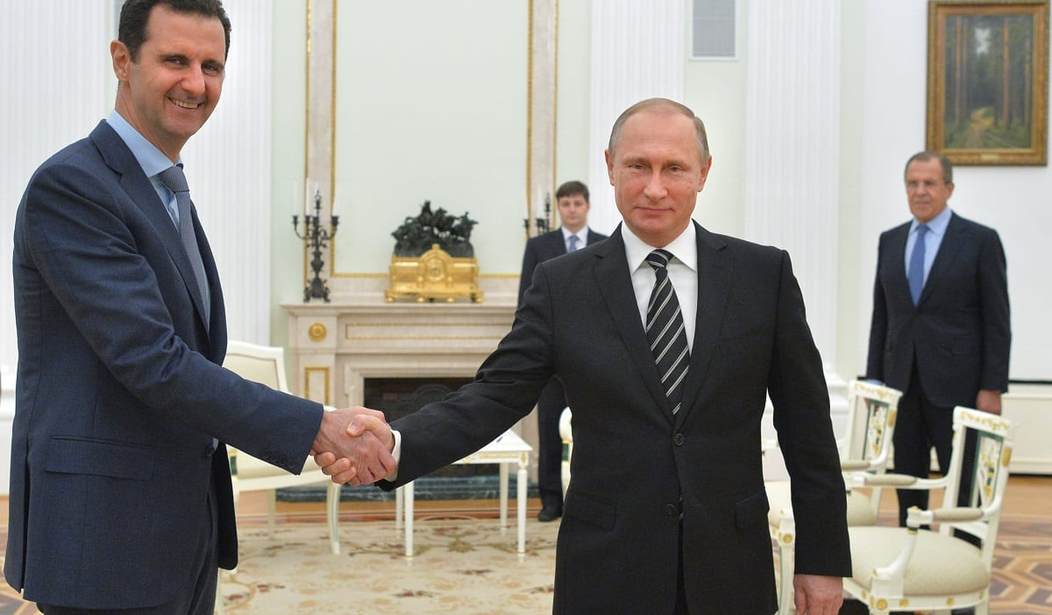One of the hallmarks of Barack Obama’s foreign policy has been that anytime an action could be taken to make the United States look weak and feckless, this administration would opt for that action. Knowing that has enabled objectively weak despots, like Syria’s Bashar Assad, to do pretty much as they wish without fear of any consequences.
Back in 2012, it became very apparent that Assad was using chemical weapons on rebel forces… and on whatever noncombatants that happened to get in the way. On August 20, 2012, Obama issued his infamous “red line” challenge to the Syrian regime:
“We have been very clear to the Assad regime, but also to other players on the ground, that a red line for us is we start seeing a whole bunch of chemical weapons moving around or being utilized. That would change my calculus. That would change my equation.”
What did this mean? Not much. The Obama administration seemed to think it was talking all gangster and stuff but the rest of the world was just laughing… me among them. All he accomplished was take an incident that could have been handled by diplomatic and economic means and make it the equivalent of an ultimatum… and then abruptly change his mind.
In fact, even Obama, himself, belatedly realized that you can’t bluff if everyone knows you are bluffing. Only a year after the “red line” pronouncement, Obama was running away from it as fast as his spindly shanks would carry him:
“I didn’t set a red line. The world set a red line.”
What ensued was comedy gold — if you didn’t have any particular stake in minimizing the risk of thermonuclear war.
Obama was unable to enforce his redline. Russia volunteered their good offices, gained control of the process, protected their ally, and left the United States looking like a pathetic a**hole.
(Let me pimp some pretty good stuff I wrote at the time on how this was going to play out here | here | here)
Despite all the evidence to the contrary, the administration continued to proclaim this endeavor as a huge success. For instance, in July of this year, an Obama bootlick improbably named Derek Chollet, took to the pages of POLITICO to crow about just how wonderful Obama was in dealing with Syrian chemical weapons.
Despite the unexpected success of the whole episode, Obama’s sudden pivots—first abruptly pausing to go to Congress, then seizing a surprise opening for diplomacy—struck many in Washington and abroad as unseemly. It did not help that unscripted comments both got the U.S. into the situation (Obama’s original red line statement in August 2012) as well as out of it (Kerry’s public musing that Syria could avoid strikes by giving up its chemical weapons). Where the president saw nimble improvisations adjusting to new opportunities, the critics saw lurching indecision.
…
In fact, the red line chapter is emblematic of Obama’s foreign policy strategy: This kind of long-range, flexible, restrained and targeted policy is a hallmark of his unique approach to global problems. But instead of being seen as a mistake, it should be considered an accomplishment. Judged by what the red line was originally intended to do—address the massive threat from Syria’s chemical weapons—it was a success. In fact, it has been perhaps the only positive development related to the Syria crisis.
Let’s fast forward until this week:
An independent report released to the United Nations Security Council on Wednesday concluded that both Syria’s government and the Islamic State terrorist group have used chemical weapons against civilians.
The report identified two incidents in which the Syrian regime unleashed chlorine gas against its own population in Idlib province on April 21, 2014 and March 16, 2015. Islamic State used mustard gas in Aleppo governorate on Aug. 21, 2015, it said.
The Joint Investigative Mechanism of the U.N. and the Organization for the Prohibition of Chemical Weapons, known as the JIM, conducted the investigation under the mandate of the Security Council. Over a course of a year, international experts investigated nine cases of chemical attacks in Syria. It was able to name the culprit in three incidents, finding the six other cases inconclusive.
And now we’re heading back to the UN for action to be taken against Syria. This would be the same UN where Syria’s patron, Russia, has a veto. That would be the same Russia that is now firmly ensconced in Syria and is wooing Turkey from NATO.
The fact is that we don’t really have any assurance that Assad ever divested himself of his chemical inventory. The fact that ISIS has just started using mustard gas indicates that they only recently came into possession of it. This implies that either Syria held back stocks (the most likely scenario) or that it has ginned up a secret production line somewhere (not implausible given the simplicity of making mustard gas).
In Syria, Obama, as he is prone to do, blusters like a playground bully. He let his mouth paint the United States into a corner from which there was no real way out. Assad quickly took measure of Obama and gained control of the situation. And he continues to show the world, but more importantly his battlefield foes and his population, that he will do what he damned well pleases and that no one can interfere. And he’s right.












Join the conversation as a VIP Member